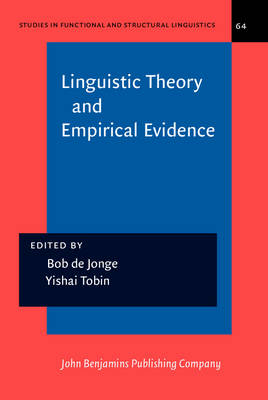
Linguistic Theory and Empirical Evidence
John Benjamins Publishing Co (Verlag)
978-90-272-1574-1 (ISBN)
This volume further elaborates the empirical tradition of Columbia School (CS) Linguistics by offering diverse empirical analyses for a wide variety of languages. These studies open a much needed debate advocating the necessity of the independent validation of linguistic hypotheses. This research exemplifies how such a validation should be conducted by determining which forms underlie the analyses and extracting those observations that are considered to be objective. The volume consists of two parts: a section on synchronic and diachronic grammatical problems and a section on Phonology as Human Behavior (PHB), the Columbia School version of phonology, applied to evolutionary, developmental and clinical issues and the phonotactics of the selected lexicon of a literary text. It provides a wealth of useful empirical data and in-depth and sophisticated qualitative and quantitative analyses of a broad range of languages from diverse families: French, Spanish, Afrikaans, Dutch, English, Polish, Russian, Japanese, and Hebrew.
1. Introduction: Linguistic theory and empirical evidence (by Jonge, Bob de); 2. Part 1. Independent evidence in grammar; 3. The distribution of linguistic forms and textual structure: Two sign-oriented approaches to the textual analysis of the use of the French Indicative and Subjunctive (by Dreer, Igor); 4. Semantic regularities of the so-called irregular Internal Vowel Alternation (IVA) Nominal (umlaut) and Verbal (ablaut) forms in Old and Modern English (by Even-Simkin, Elena); 5. Al hablar, se alterna hablando: Syntactic variation between two non-finite Spanish constructions (by Jonge, Bob de); 6. Instructional meanings, iconicity, and l'arbitraire du signe in the analysis of the Afrikaans demonstratives (by Kirsner, Robert S.); 7. Focus system of the Japanese benefactive auxiliaries kureru and morau (by Riggs, Hidemi Sugi); 8. Part 2. Phonology as human behavior; 9. Phonology as human behavior from an evolutionary point of view (by Tobin, Yishai); 10. Phonology as human behavior: The prosody of normal and pathological speech of Buenos Aires Spanish (by Enbe, Claudia); 11. Phonology as human behavior: 'Non-Vocalization' - A phonological error process in the speech of severely and profoundly hearing impaired adults - from the point of view of the theory of phonology as human behavior (by Halpern, Orly); 12. Phonology as human behavior: Comparing and contrasting phonological processes in adult dysarthria and first language acquisition (by Polczynska, Monika); 13. A phonological analysis of the lexicon of a literary work (by Roe-Portiansky, Inessa); 14. Name index; 15. Subject index
| Erscheint lt. Verlag | 9.6.2011 |
|---|---|
| Reihe/Serie | Studies in Functional and Structural Linguistics ; 64 |
| Verlagsort | Amsterdam |
| Sprache | englisch |
| Maße | 164 x 245 mm |
| Gewicht | 710 g |
| Themenwelt | Geisteswissenschaften ► Philosophie ► Sprachphilosophie |
| Geisteswissenschaften ► Sprach- / Literaturwissenschaft ► Sprachwissenschaft | |
| ISBN-10 | 90-272-1574-X / 902721574X |
| ISBN-13 | 978-90-272-1574-1 / 9789027215741 |
| Zustand | Neuware |
| Haben Sie eine Frage zum Produkt? |
aus dem Bereich


